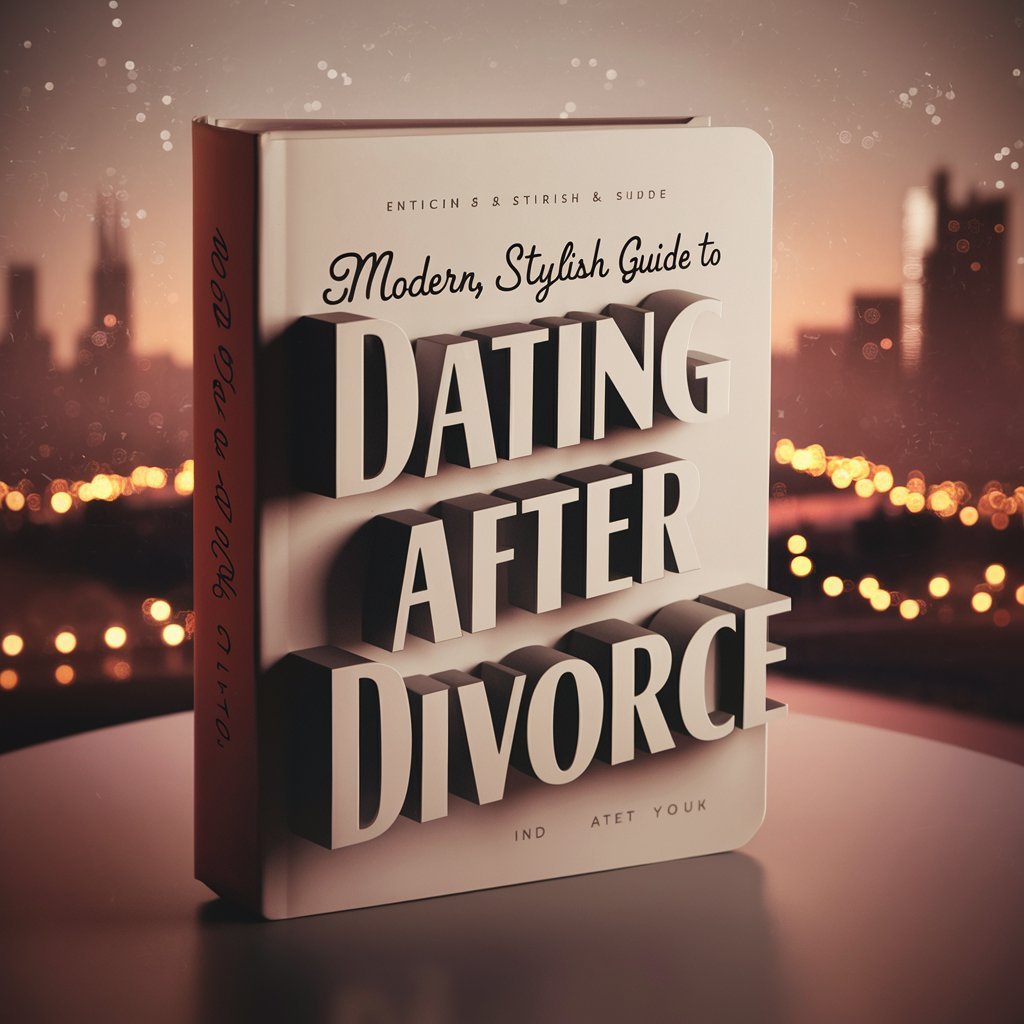Rediscover Love: Your Comprehensive Guide to Dating After Divorce
Embark on a journey of self-discovery and new beginnings
Your New Chapter Begins Here
Welcome to your personalized guide for navigating the exciting world of post-divorce dating. This isn’t just an article – it’s a comprehensive resource designed to help you rediscover love, build confidence, and create meaningful connections.
of first marriages end in divorce
While this statistic might seem daunting, it’s important to remember that divorce can often lead to personal growth and new opportunities for happiness. Many individuals find that their second marriages are more successful due to the wisdom gained from their past experiences.
1. The Healing Journey: Your Emotional Compass
Before we dive into the dating pool, let’s take a moment to check in with your emotions. Understanding and processing your feelings is crucial for a healthy transition back into dating.
Remember, healing is not linear. It’s normal to have ups and downs. The key is to acknowledge your feelings and continue moving forward.
The Science of Emotional Healing
Research in neuroscience has shown that emotional pain activates the same brain regions as physical pain. This explains why the end of a marriage can feel so devastating. However, studies also indicate that the brain has a remarkable ability to heal and rewire itself, a concept known as neuroplasticity.
Here are some science-backed strategies to support your emotional healing:
- Practice mindfulness meditation to reduce stress and anxiety
- Engage in regular physical exercise to boost mood-enhancing endorphins
- Maintain a consistent sleep schedule to support emotional regulation
- Cultivate social connections to combat feelings of loneliness
- Consider cognitive-behavioral therapy (CBT) to reshape negative thought patterns
2. Assessing Your Readiness: Green Lights for Your Heart
Knowing when you’re truly ready to start dating again is crucial. Let’s explore some key indicators together.
The Psychology of Readiness
Psychological readiness to date after divorce is influenced by various factors, including:
- Emotional Intelligence (EI): Higher EI is associated with better relationship outcomes. Take time to develop self-awareness and emotional regulation skills.
- Attachment Style: Understanding your attachment style (secure, anxious, avoidant, or fearful-avoidant) can help you navigate new relationships more effectively.
- Self-Concept Clarity: A clear sense of who you are post-divorce is crucial. This may take time to develop as you rediscover your individual identity.
Average time experts recommend waiting before dating after divorce
However, remember that everyone’s journey is unique. It’s more important to focus on your personal growth and emotional state rather than adhering to a strict timeline.
3. Navigating Online Dating: Your Digital Love Map
In today’s digital age, online dating has become a primary way to connect. Let’s explore how to make the most of these platforms.
The Evolution of Online Dating
Online dating has transformed the way people meet potential partners:
- 1995: Match.com launches, pioneering online dating
- 2000s: eHarmony introduces compatibility matching algorithms
- 2012: Tinder popularizes the “swipe” feature, changing online dating dynamics
- 2020s: Video dating becomes mainstream, accelerated by the global pandemic
of Americans use online dating to meet potential partners
Tips for Successful Online Dating
- Choose recent, authentic photos that showcase your personality
- Craft a bio that highlights your unique qualities and interests
- Be honest about your divorced status and what you’re looking for
- Take time to read profiles and send personalized messages
- Stay safe by meeting in public places and informing a friend of your plans
- Don’t get discouraged – finding the right match takes time and patience
4. Rebuilding Confidence: Your Personal Power Boost
Confidence is key in the dating world. Let’s work on boosting your self-assurance with some evidence-based strategies.
The Science of Self-Confidence
Self-confidence is not just a feeling – it’s a skill that can be developed. Research in positive psychology has identified several strategies to boost confidence:
- Practice Self-Compassion: Treat yourself with the same kindness you’d offer a friend
- Set Achievable Goals: Success in small tasks builds confidence for bigger challenges
- Use Power Posing: Adopting confident body language can influence your mental state
- Challenge Negative Self-Talk: Replace self-defeating thoughts with realistic, positive ones
- Embrace Growth Mindset: View challenges as opportunities for growth rather than threats
5. Navigating New Relationship Dynamics: Your Guide to Modern Love
The dating landscape may have changed since you were last single. Let’s explore these new waters together.
Key Trends in Modern Dating
- Slow Dating: A trend towards more meaningful connections and taking things slowly
- Conscious Dating: Increased focus on personal values, life goals, and compatibility
- Virtual Dating: Rise of video dates as a precursor to in-person meetings
- Increased Openness: Greater acceptance of diverse relationship structures and identities
of people believe online dating allows them to find a better match
Navigating Digital Communication
Understanding modern dating etiquette is crucial. Here are some guidelines:
- Respond to messages within 24 hours if interested
- Use emojis sparingly to convey tone, but don’t overdo it
- Avoid excessive texting before meeting in person
- Be clear about your intentions and expectations
- Remember that tone can be easily misinterpreted in text – when in doubt, call or video chat
6. Balancing Dating and Family: Your Harmony Strategy
If you have children, balancing your dating life with family responsibilities requires thoughtful planning. Let’s explore strategies that work.
The Impact of Parental Dating on Children
Research shows that parental dating after divorce can have both positive and negative effects on children, depending on how it’s handled:
- Positive Effects: Seeing a parent happy and in a healthy relationship can model good relationship skills for children
- Potential Challenges: Children may experience loyalty conflicts or fear of abandonment
Tips for Dating as a Single Parent
- Be honest with your children about dating, using age-appropriate language
- Maintain consistent routines to provide stability for your children
- Wait until a relationship is serious before introducing a partner to your children
- Reassure your children that your love for them is unconditional and unchanging
- Seek support from a family therapist if needed to navigate this transition
7. Prioritizing Self-Care: Nurturing Your Best Self
As you embark on your dating journey, it’s crucial to prioritize self-care. Taking care of yourself physically, emotionally, and mentally will not only make you more attractive to potential partners but will also ensure you’re in the best position to build healthy relationships.
The Science of Self-Care
Research has shown that practicing self-care can lead to:
- Reduced stress and anxiety
- Improved mood and emotional regulation
- Enhanced self-esteem and confidence
- Better physical health and immune function
- Increased resilience in facing life’s challenges
Remember to engage in regular self-care activities such as exercise, meditation, pursuing hobbies, and spending time with loved ones.
Your New Beginning Awaits
Remember, every person’s journey is unique. Be patient with yourself, celebrate small victories, and don’t be afraid to seek support when you need it. Your divorce doesn’t define you; it’s merely a chapter in your life story. The next chapter is yours to write, filled with potential for love, growth, and happiness.
of people who divorce remarry within 10 years
This statistic shows that many people do find love again after divorce. However, the goal isn’t just to be in a relationship, but to be in a healthy, fulfilling one. Take the time to heal, grow, and discover what truly makes you happy.
Your Dating After Divorce FAQ
While there’s no one-size-fits-all timeline, experts generally suggest waiting at least 6 months to a year after finalizing your divorce. This period allows you to:
- Process emotions and heal
- Rediscover your individual identity
- Reflect on lessons from your past relationship
- Establish a new routine
Ultimately, you’re ready when you feel emotionally stable and excited about new possibilities.
Approaching this conversation with sensitivity is key:
- Choose a calm moment for an uninterrupted talk
- Use age-appropriate language
- Be honest about meeting new friends
- Reassure them of your unchanging love
- Listen to their concerns openly
- Introduce the idea gradually
Remember, children often need time to adjust. Patience and open communication are crucial throughout this process.
Yes, guilt is a common feeling when starting to date post-divorce. It might stem from:
- Feeling like you’re betraying your ex or marriage vows
- Concerns about effects on children
- Feeling like you’re moving on “too soon”
- Guilt over feeling happy or excited
Remember, these feelings are normal but not necessarily rational. Moving on is healthy and natural. To cope:
- Acknowledge your feelings without judgment
- Remind yourself that you deserve happiness
- Seek support from friends, family, or a therapist
- Focus on personal growth and positivity
The dating landscape has evolved significantly:
- Online Dating Dominance: Apps and websites are now primary meeting grounds
- Casual Dating Culture: There’s often more emphasis on casual dating initially
- Digital Communication: Texting and messaging are common, especially early on
- Social Media Integration: Many research potential dates on social platforms
- Diverse Relationship Models: Greater acceptance of various relationship structures
- Video Dating: Virtual dates have become more common, especially post-pandemic
While these changes might seem overwhelming, they also offer new opportunities for connection. Take your time to explore and find what works best for you.
While not necessary to lead with, it’s generally best to be upfront about your divorced status early on. Here’s why:
- Honesty: Sets the foundation for open communication
- Filtering: Helps find partners comfortable with your situation
- Avoiding Awkwardness: Prevents uncomfortable surprises later
- Authenticity: Allows you to be your true self from the start
When disclosing:
- Keep it simple in your profile
- Focus on who you are now and what you’re seeking
- Be prepared to discuss further when connecting with matches
Remember, divorce is a common life experience. Many will appreciate your honesty and see your life experience as an asset.
Rejection is a normal part of dating, but it can be particularly challenging after divorce. Here are some strategies to cope:
- Reframe Your Perspective: View rejection as redirection, not failure
- Practice Self-Compassion: Be kind to yourself and avoid self-blame
- Maintain Perspective: Remember that rejection is often about compatibility, not personal worth
- Learn and Grow: Reflect on each experience as an opportunity for self-improvement
- Stay Resilient: Don’t let rejection deter you from putting yourself out there
Remember, everyone faces rejection in dating. It’s not a reflection of your value as a person or your potential for future relationships.

